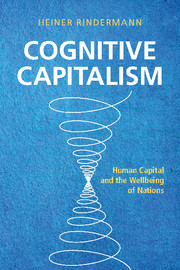
-
Select format
-
- Publisher:
- Cambridge University Press
- Publication date:
- 01 February 2018
- 15 February 2018
- ISBN:
- 9781107279339
- 9781107050167
- 9781107651081
- Dimensions:
- (228 x 152 mm)
- Weight & Pages:
- 1.04kg, 592 Pages
- Dimensions:
- (228 x 152 mm)
- Weight & Pages:
- 0.92kg, 592 Pages
- Subjects:
- Economics, Economic Development and Growth, Psychology, Cognition
You may already have access via personal or institutional login- Subjects:
- Economics, Economic Development and Growth, Psychology, Cognition
Book description
Nations can vary greatly in their wealth, democratic rights and the wellbeing of their citizens. These gaps are often obvious, and by studying the flow of immigration one can easily predict people's wants and needs. But why are there also large differences in the level of education indicating disparities in cognitive ability? How are they related to a country's economic, political and cultural development? Researchers in the paradigms of economics, psychology, sociology, evolution and cultural studies have tried to find answers for these hotly debated issues. In this book, Heiner Rindermann establishes a new model: the emergence of a burgher-civic world, supported by long-term background factors, furthered education and thinking. The burgher-civic world initiated a reciprocal development changing society and culture, resulting in past and present cognitive capital and wealth differences. This is an important text for graduate students and researchers in a wide range of fields, including economics, psychology, sociology and political science, and those working on economic growth, human capital formation and cognitive development.
Reviews
'In an era where most intelligent people are poorly informed about intelligence, Heiner Rindermann’s book is especially welcome. The title of the book effectively summarizes what is most crucial for the economic well-being of a people: Cognitive Capitalism. The author, who grew up in East Germany at a time when the Berlin Wall still stood, is the best-qualified person to integrate intelligence research with the literature on the determinants of economic growth.'
Gregory Christainsen - Professor Emeritus, California State University, East Bay
'Cognitive Capitalism is a tour de force of the science of country level differences in cognitive ability. It raises important questions about the role of cognitive ability for culture, health, economics, education, technology, immigration and government. The theory of cognitive capitalism promises to inform our understanding of country level differences just as Darwin’s theory informed our understanding of individual differences.'
Thomas R. Coyle - University of Texas, San Antonio
Contents
Metrics
Altmetric attention score
Full text views
Full text views help Loading metrics...
Loading metrics...
* Views captured on Cambridge Core between #date#. This data will be updated every 24 hours.
Usage data cannot currently be displayed.
Accessibility standard: Unknown
Why this information is here
This section outlines the accessibility features of this content - including support for screen readers, full keyboard navigation and high-contrast display options. This may not be relevant for you.
Accessibility Information
Accessibility compliance for the HTML of this book is currently unknown and may be updated in the future.


